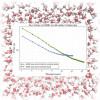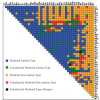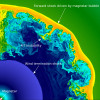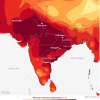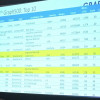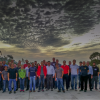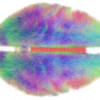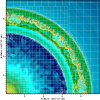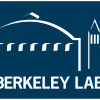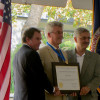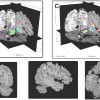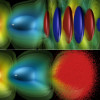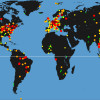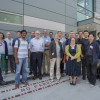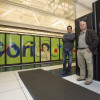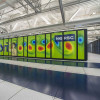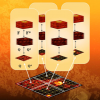News Center
Former Summer Student Jessica Hatcher Wins Research Award
Berkeley Lab Computing Sciences-sponsored summer student Jessica Hatcher won a first place award for her research poster “Quantitative Structure Activity Relationships (QSAR) for Biological Effects of Synthetic Cathinones” at the 74th Joint Annual Meeting of The National Institute of Science/ Beta Kappa Chi. Hatcher was mentored by CRD's Bert de Jong last summer. Read More »
Berkeley Lab Researchers Make NWChem’s Planewave “Purr” on Intel’s Knights Landing Architectures
Berkeley Lab researchers have successfully added thread-level parallelism on top of MPI-level parallelism in the planewave density functional theory method within the popular software suite NWChem. An important step to ensuring that computational chemists are prepared to compute efficiently on next-generation exascale machines. Read More »
A “VAST” Step Forward in Cyber Security
CRD network researcher Vern Paxson and postdoc Matthias Vallentin are developing VAST, a system that will help forensic security analysts pinpoint how much of an organization’s computer network has been compromised, and where. Read More »
Berkeley’s Lin Lin Awarded 2017 SIAG/CSE Early Career Prize
Berkeley Lab’s Lin Lin has ben honored with a 2017 SIAM Activity Group on Computational Science and Engineering Early Career Prize. The honor is bestowed to one outstanding early career researcher that has made distinguished contributions to the field within seven years of receiving a Ph.D. Read More »
Machine Learning Method Accurately Predicts Metallic Defects
For the first time, researchers at Berkeley Lab have built and trained machine learning algorithms to predict defect behavior in certain intermetallic compounds with high accuracy. This method will accelerate research of new advanced alloys and lightweight new materials for applications spanning automotive to aerospace and much more. Read More »
Simulations Reveal the Invisible Chaos of Superluminous Supernovae
To better understand the physical conditions that create superluminious supernova, astrophysicists are running 2D simulations of these events using supercomputers at NERSC and CRD developed CASTRO code.
Read More »
Simulations Confirm Observations of 2015 India/Pakistan Heat Waves
A paper published December 15 during the American Geophysical Union (AGU) fall meeting in San Francisco points to new evidence of human influence on extreme weather events. Read More »
CRD’s Ibrahim Cracks Graph500 with Precisely Tuned Data-Intensive Algorithms
When the latest version of the Graph 500 list was released Nov. 16 at the SC16 conference, there were two new entries in the top 10, both contributed by Khaled Ibrahim of Berkeley Lab’s Computational Research Division. Read More »
CAMERA Workshop Tackles Tomographic Reconstruction
CAMERA—the Center for Advanced Mathematics for Energy Research Applications at Lawrence Berkeley National Laboratory—recently hosted a workshop to highlight the state-of-the-art in tomographic reconstruction algorithms and software for synchrotrons. Read More »
Global Brain Initiatives Generate Tsunami of Neuroscience Data
Around the world, various 'Brain Initiatives' are generating a tsunami of neuroscience data. But without a coherent strategy to analyze, manage and understand the data, advancements in the field will be limited. That's why Berkeley Lab's Kristofer Bouchard assembled an international team of interdisciplinary researchers to develop a plan to overcome the big data challenge. Read More »
Berkeley Lab to Lead AMR Co-Design Center for DOE’s Exascale Computing Project
Berkeley Lab will lead one of four co-design centers under the Department of Energy’s Exascale Computing Project (ECP). The Block-Structured Adaptive Mesh Refinement Co-Design Center will be led by John Bell of the lab’s Computational Research Division, with support from Argonne National Laboratory and the National Renewable Energy Laboratory. Read More »
Berkeley Lab to Lead Three Exascale Software Projects, Support Four Others
Berkeley Lab computer scientists will lead three projects to develop software technologies for next-generation supercomputers under the Department of Energy’s Exascale Computing Project (ECP). Lab researchers will also provide support to four other ECP software projects. Read More »
CCSI Toolset Wins R&D100 Award
The CCSI Toolset—a suite of computational tools and models designed to accelerate the development of cost-effective carbon capture technology—has been awarded a 2016 R&D100 Award. Read More »
CRD, NERSC Staff Honored with 2016 Director’s Achievement Awards
Several staff in the Berkeley Lab Computing Sciences organization are recipients of this year’s Director’s Awards for Exceptional Achievement. Read More »
Berkeley Lab 2016 Alvarez Fellow: Matthew Zahr
Berkeley Lab’s 2016 Alvarez Fellow, Matthew Zahr will be developing efficient, projection-based methods for solving optimization problems constrained by partial differential equations in the Computational Research Division (CRD) Math group. Read More »
CRD’s Julian Borrill Receives NASA's Exceptional Public Achievement Medal
Julian Borrill, leader of the Computational Cosmology Center at Lawrence Berkeley National Laboratory, has been awarded the NASA Exceptional Public Achievement Medal for "conceiving and implementing the mission-critical high performance computing system for Planck data analysis." Read More »
Brain Modulyzer Provides Interactive Window Into the Brain
A new tool developed at Berkeley Lab allows researchers to interactively explore the hierarchical processes that happen in the brain when it is resting or performing tasks. Scientists also hope that the tool can shed some light on how neurological diseases like Alzheimer’s spread throughout the brain. Read More »
The Incredible Shrinking Particle Accelerator
WarpIV, a new data analysis/visualization toolkit developed at Berkeley Lab, is designed to help speed particle accelerator research and design by enabling in situ visualization and analysis of accelerator simulations at scale. Read More »
Scientific Diplomacy: Berkeley Lab Hosts 2016 TechWomen
In September two researchers from Africa visited Berkeley Lab as part of the State Department’s TechWomen—an international exchange that brings emerging women leaders in STEM from Africa, Central Asia and the Middle East together with their professional counterparts in the U.S. Read More »
Longest Record of Continuous Carbon Flux Data is Now Publicly Available
Approximately 450 carbon flux sites worldwide are sharing their observation data with the FLUXNET database. The project’s most recent data release—FLUXNET2015—includes some of the longest continuous records of ecosystem data ever taken. Read More »
Berkeley Lab Collaboration Enhances Optical Chip Design Process
A unique collaboration between computers scientists and mathematicians from Berkeley Lab's Computing Sciences group and Ciena, a major U.S. telecommunications equipment provider, has helped dramatically improve design cycle times for Ciena's high-speed optical networking components. Read More »
Berkeley Lab Hosts UK Scientific Technology Facilities Council
Twelve members of the UK’s Scientific Technology Facilities Council visited Berkeley Lab to discuss approaches for managing and analyzing the deluge of data being produced by current and next-generation synchrotron light sources. Read More »
Berkeley Lab to Lead 5 Exascale Projects, Support 6 Others
Scientists at the Department of Energy’s (DOE) Lawrence Berkeley National Laboratory (Berkeley Lab) will lead or play key roles in developing 11 critical research applications for next-generation supercomputers as part of DOE’s Exascale Computing Project (ECP). Read More »
Berkeley Lab to Partner with Five U.S. Manufacturers Via HPC4Mfg Program
The U.S. Department of Energy’s High Performance Computing for Manufacturing (HPC4Mfg) Program has announced $3.8 million in funding for 13 new industry projects in the second round of the HPC4Mfg program, and Lawrence Berkeley National Laboratory has been selected to partner with five of the new projects. Read More »
SHARP: A "Killer App" for Ptychography
A revolutionary x-ray imaging technique that combines diffraction and microscopy, has now been coupled with applied mathematics and supercomputing to quickly turn high-throughput "imaging by diffraction" datasets into the sharpest 3D images ever produced. Read More »









